江苏省江阴市成化高级中学高中英语 Unit1 Advertising reading教案 牛津译林版必修4
- 格式:doc
- 大小:116.51 KB
- 文档页数:7
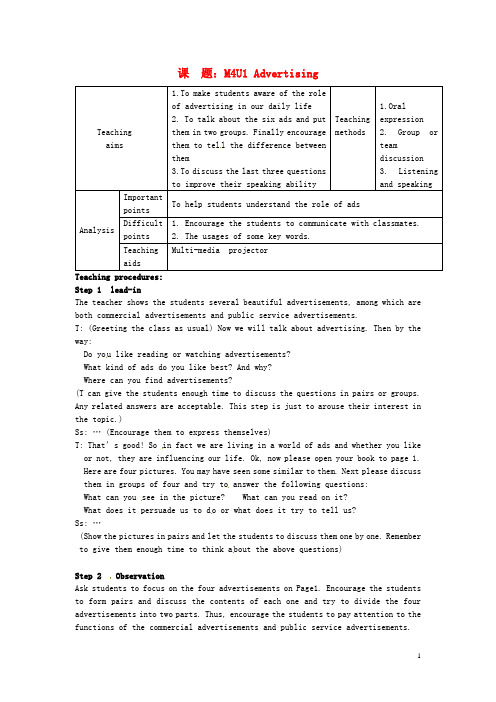
课题:M4U1 Advertisingthem to telTeaching procedures:Step 1 lead-inThe teacher shows the students several beautiful advertisements, among which are both commercial advertisements and public service advertisements.T: (Greeting the class as usual) Now we will talk about advertising. Then by the way:Do yo u like reading or watching advertisements?What kind of ads do you like best? And why?Where can you find advertisements?(T can give the students enough time to discuss the questions in pairs or groups. Any related answers are acceptable. This step is just to arouse their interest in the topic.)Ss: … (Encourage them to express themselves)T: That’s good! So in fact we are living in a world of ads and whether you like or not, they are influencing our life. Ok, now please open your book to page 1. Here are four pictures. You may have seen some similar to them. Next please discuss them in groups of four and try to answer the following questions:What can you see in the picture? What can you read on it?What does it persuade us to d o or what does it try to tell us?Ss: …(Show the pictures in pairs and let the students to discuss them one by one. Remember to give them enough time to think a bout the above questions)Step 2 ObservationAsk students to focus on the four advertisements on Page1. Encourage the students to form pairs and discuss the contents of each one and try to divide the four advertisements into two parts. Thus, encourage the students to pay attention to the functions of the commercial advertisements and public service advertisements.T: Well done! Now you can see that advertisements are a good way to sell products or services. They are also a good way to make people aware of the needs of others and the dangers around them. Next please look at the table below and then go through the four pictures again. Later on put each of them in the correct group.T: Wonderful. I think most of you have realized the difference between the two. And in the reading we will have a further discussion.Step 3 DiscussionOrganize the students into four groups and ask each group to talk about one of the four pictures in front of the whole class. Each group should choose one representative to present their ideas to the whole class. The three questions can help the students to start the discussion.Provide the students more meaningful and interesting advertisements and encourage them to think about an appropriate slogan for each one.Step 4: DiscussionT: So, now look at the three questions and discuss them in groups of four.1) What was it? Now do you believe that advertisements tell the complete truth?2) What is/are your favorite advertisement(s) making you think about problems in society or about people who need help? Why?3) What do you think makes a good advertisement?Ss: …(T can help the students to conduct the activity and encourage them to work together to complete the task. Later let some students to show off.) T: Well done. Now I think most of you have know what an advertisement is and realize the role of them in our life.Step 5 HomeworkAsk students to look for more information about ads and make good preparations for the reading part. The students can surf the net if they have access to it.Langu age Points1. advertise (P1)⑴ v.为……做广告,登广告宣传advertise sth. in the news paperThe perfum e has been advertised in all the major women’s magazines.这种香水在所有主要的女性杂志上都做了广告。

Unit 1 Advertising Period One Welcome to the unit & ReadingAdvertisingAdvertising is only part of the total sales effort,but it is the part that attracts the most attention.This is natural enough because advertising is designed for just that purpose.The simplest kind of advertising is the classified ad.Every day the newspapers carry a few pages of these ads;in the large Sunday editions there may be several sections of them.A classified ad is usually only a few lines long.It is really a notice or an announcement that something is available.Newspapers also carry a large amount of display advertising.Newspapers generally reach an audience only in a limited area.To bring their message to a larger audience,many who want to put out their ads use national magazines.Many of the techniques of modern advertising were developed in magazine ads.The use of bright colors,attractive pictures,and short messages is all characteristics of magazine ads.The most important purpose is to catch the eye.The message itself is usually short,often no more than a slogan which the public identifies with the product.The same techniques have been carried over into television advertising.Voices and music have been added to color and pictures to catch the ear as well as the eye.Television ads are repeated over and over again so that the audience sees and hears them many mercial television has mixed entertainment and advertising.Notes1.slogan n.(广告)标语mercial adj.商业的;营利的;靠广告收入的TaskRead the passage and answer the following questions.1.A notice in a newspaper belongs to classified ads.2.In this passage there are three kinds of media that carry ads mentioned.Period One Welcome to the unit & ReadingⅠ.单词自测1.advertising n.做广告;广告活动;广告业advertisement n.广告;广告宣传advertise vt.& vi.做广告,宣传2. drug n.毒品;药,药物3. shine n.光亮,光泽;vi.发光,闪耀shiny adj.发光的,闪耀的4.persuade vt.说服,劝说;使信服5.welfare n.(个体或群体的)幸福、安全和健康;福利6.cheat vt.& vi.欺骗;作弊;n.骗子;欺诈行为7.skilful adj.有技巧的;熟练的skill n.技巧8.innocent adj.清白的,无罪的;无恶意的;纯真的innocence n.清白,无辜9.breath n.气息;呼吸breathe vt.& vi.呼吸10.fool vt.欺骗,愚弄;n.傻瓜foolish adj.傻的11.cure vt.治愈;解决;n.药物,疗法;对策12.pleased adj.高兴,满意;乐于(做某事)please vt.使高兴ment n.评论,评价;vi.评论,议论14.mental adj.心理的;思想的,精神的;智力的mentally adv.精神上地15.trick n.骗局;玩笑,恶作剧;戏法,把戏;诀窍;vt.欺骗,欺诈16.aim vt.& vi.以……为目标;瞄准;n.目的,目标17.campaign n.运动(为了某种目的而进行的一系列有计划的活动)18.motto n.座右铭;格言,箴言19.benefit vt.& vi.使受益;得益于;n.益处;救济金;资金20.promote vt.推广,宣传;促销;促进,推动21.intelligence n.智力,才智;情报intelligent adj.有才智的,聪明的22.slave n.完全受……控制的人;奴隶23.consult vt.咨询;请教prehension n.理解力,领悟能力;理解练习Ⅱ.短语自测1.be related to与……相关2.stand for代表;象征3.be meant to旨在,目的是4.protect...against/from sth.保护,防护……不受到……5.be aware of意识到;明白6.even if/though虽然,即使7.fall for上……的当,受……的骗8.play tricks on欺骗;捉弄9.deal with涉及,关于;处理,应付10.warn against提醒注意;警告11.agree with sb.同意某人Ⅰ.根据课文内容选择正确答案1.How many main types of advertisements are there in our life generally?A.One.B.Two.C.Three.D.Four.答案 B2.What is the purpose of PSAs?A.To attract people’s attention.B.To promote commercial products.C.To advertise various services.D.To educate the public and help people lead better lives.答案 D3.What should we do when it comes to advertisements?A.We should believe these advertisements totally.B.We should never believe these advertisements.C.We should use our intelligence and not be a slave to them.D.We should believe that all ads are meant to benefit the public.答案 C4.In the following sentences,which is NOT true?A.Some PSAs teach people to live healthy lives.B.PSAs stand for public service advertisements.mercial advertisements are often run for free.D.There are laws to protect people from advertisements that cheat people.答案 C5.When did China begin a nationwide public service advertising campaign?A.In 1996.B.In 1986.C.In 1990.D.In 1998.答案 AⅡ.阅读课文完成下表,每空一词Title:AdvertisementsThe function of advertisements is to persuade people to buy things or accept ideas.Advertisements can be found in all kinds of media.There are two main types:commercial advertisements and public service advertisements.Ⅳ.难句分析A commercial advertisement is one which someone has paid for to advertise a product or service.句式分析:句中which引导一个定语从句,修饰先行词one。
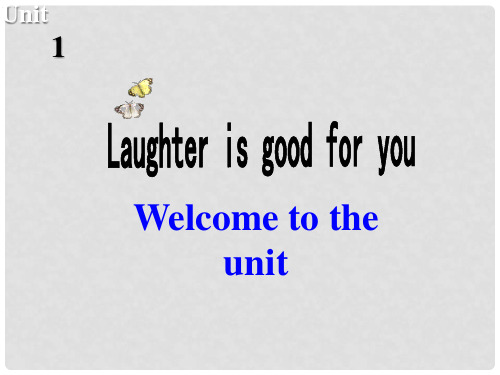
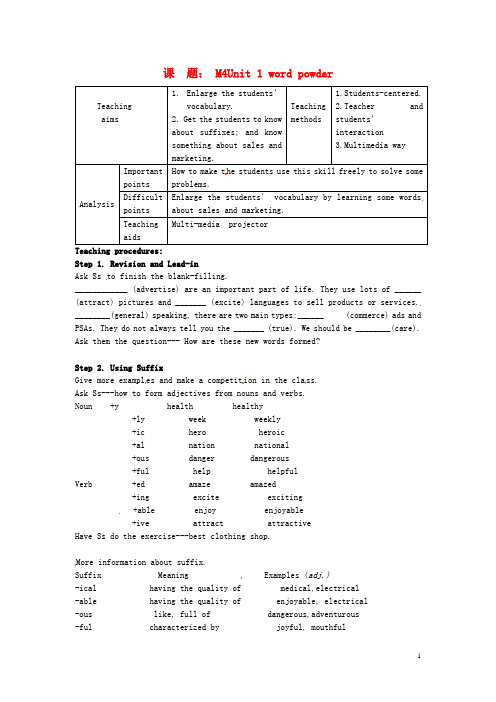
课题: M4Unit 1 word powderheTeaching procedures:Step 1. Revision and Lead-inAsk Ss to finish the blank-filling.____________ (advertise) are an important part of life. They use lots of ______ (attract) pictures and _______ (excite) languages to sell products or services. ________(general) speaking, there are two main types:______ (commerce) ads and PSAs. They do not always tell you the _______ (true). We should be ________(care). Ask them the question--- How are these new words formed?Step 2. Using SuffixGive more exampl es and make a competit ion in the cla ss.Ask Ss---how to form adjectives from nouns and verbs.Noun +y health healthy+ly week weekly+ic hero heroic+al nation national+ous danger dangerous+ful help helpfulVerb +ed amaze amazed+ing excite exciting+able enjoy enjoyable+ive attract attractiveHave Ss do the exercise---best clothing shop.More information about suffix.Suffix Meaning Examples (adj.)-ical having the quality of medical,electrical-able having the quality of enjoyable, electrical-ous like, full of dangerous,adventurous-ful characterized by joyful, mouthful-less without careless, hopelessMake Ss do the puzzle.Step 3.Active show to lead in the topic.Suppose you are a book seller. You want your customer to buy a new book called ‘English Literature’. How can you make your customer buy it? Make a dialogue with your partner and then have it presented.Useful expressions:Product Market researchSales and marketing Sales/marketing departmentConsumers Ma rket shareSales target Sales figuresHave Ss do Practice B.More exercise for consolidation.I want to buy some milk ________ from the shop. ________of milk usually go up during this time. I like ‘Fresh’ milk very much because this band is really u________ Recent sales ________show that it is popular among _______. The shop also gives much _______ of 10 per cent for cash. Why don’t you have a try?Step 5 Lang uage points1. be tired of =be sick of 对------厌烦(P6)She has become tired of doing such things.这样的事,她她已经干厌了.be tired out = be worn out 累坏了The work tired me out .这工作使我精疲力竭.She was tired out by the journey. 这次的旅行把她累坏了.be tired with =be tired from 因为------而疲劳feel tired / his tired voice / her tired look / her tired feettiring jobs/ tiring work/ boring speechIt feels like rain/ snow2. discount作名词,(可数或不可数),意为”折扣”,”减价” (P6)These goods sell at a discount. 这些商品打折出售.at a 10% discount 打九折They allowed us ten percent discount off/on the prices of goods. 他们给我们按货价打九折.discount:作动词,意为”打折扣”,”认为不重要””对------不全信”They discount twenty percent. 他们打八折.His rich experience is not to be discounted.他的丰富经验不可小看.教学反思:。
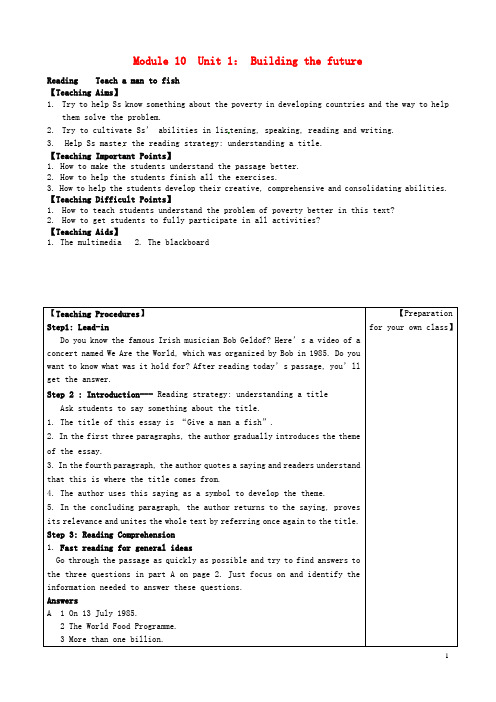
Module 10 Unit 1: Building the futureReading Teach a man to fish【Teaching Aims】1.Try to help Ss know something about the poverty in developing countries and the way to helpthem solve the problem.2.Try to cultivate Ss’ abilities in lis tening, speaking, reading and writing.3. Help Ss maste r the reading strategy: understanding a title.【Teaching Important Points】1. How to make the students understand the passage better.2. How to help the students finish all the exercises.3. How to help the students develop their creative, comprehensive and consolidating abilities.【Teaching Difficult Points】1.How to teach students understand the problem of poverty better in this text?2.How to get students to fully participate in all activities?【Teaching Aids】1. The multimedia2. The blackboard【Teaching Procedures】Step1: Lead-inDo you know the famous Irish musician Bob Geldof? Here’s a video of a concert named We Are the World, which was organized by Bob in 1985. Do you want to know what was it hold for? After reading today’s passage, you’ll get the answer.Step 2 : Introduction--- Reading strategy: understanding a titleAsk students to say something about the title.1. The title of this essay is “Give a man a fish”.2. In the first three paragraphs, the author gradually introduces the theme of the essay.3. In the fourth paragraph, the author quotes a saying and readers understand that this is where the title comes from.4. The author uses this saying as a symbol to develop the theme.5. In the concluding paragraph, the author returns to the saying, proves its relevance and unites the whole text by referring once again to the title. Step 3: Reading Comprehension1. Fast reading for general ideasGo through the passage as quickly as possible and try to find answers to the three questions in part A on page 2. Just focus on and identify the information needed to answer these questions.AnswersA 1 On 13 July 1985.2 The World Food Programme.3 More than one billion.【Preparation for your own class】2. StructureMain i dea of each paragraph1. The Live Aid concert organized by Bob Geldof.2. Hunger is the number one global health risk.3. The UN set up WFP to fight worldwide hunger.4. Food aid alone is a short-term solution to a long- term problem.5. One way to help a country is to improve its infrastructure.6. Another way to help a country is through the development of private enterprise along with job training.7. The importance of the education and training for young people.8. It’s better to teach a man to fish than to gi ve him a fish.the passage The best solution to stopping poverty in developing countrie Part 1 Paragraphs1&2 introduction of the theme---world hunger Part 2 Paragraph 3 some ways of dealing with hungerPart 3 Paragraph 4 the meaning of give a man a fishPart 4 Paragraphs5&7 alternate ways to fight world hungerPart 5 Paragraph 8 summery2.Carefully reading(1)True or false1.Bob Geldof organized the charity concert to help war victims in Ethiopia.2. According to the UN, ten million people die of hunger and malnutrition every year.3. Food aid is a great program and it can surely help all the poor countries.4. Development aid can help to improve a country’s infrastructure.5. Children will one day take control of the future of developing countries.6. To give a man a fish is the long-term solution to the problem of poverty. (2)Answer the questions in C1Step 3: Language focus1.lead to destroyed harvests and killed cattle 导致收成损毁,牛畜死亡lead to 1) 通向2) 导致 Reducing speed limits should lead to fewer deaths on theroads.lead …to…带领…去(某地) The waiter led us to our table.lead… to do =cause …to do 导致…做 What led you to believe this?lead to doing 新的证据导致那个窃贼被抓。
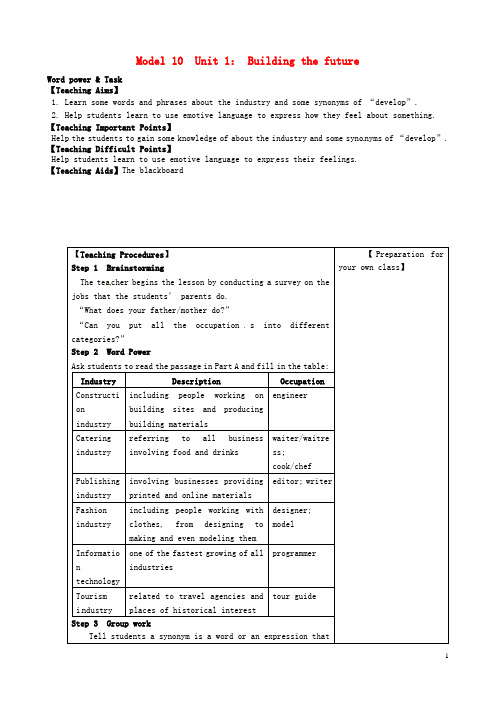
Period four :Word powerStep 1: Brainstorming1. Guessing Game:At the beginning of today’s class, let’s play a guessing game. Here are several cards, each of which says a household appliance. I’d like one of you to give a brief description of the device and o ther students to guess what it is.For referenceAn air-conditioner: It can be stationed on the wall. It can make our room warm inwinter and cool in summer.A microwave oven: It’s a type of oven which cooks food very quickly using microwaves.A refrigerator: A cabinet or room in which food is kept cold.A washing machine: A electric machine for washing clothes.A digital computer: A device that makes calculations, etc with data represented asa series of digits.A vacuum cleaner: A electrical appliance that takes up dust, dirt, etc by suction.2. Next time you are in a shop, notice the electrical and electronic goods especially household appliances that are sold and try to list as many devices as possible.Step 2: Vocabulary learning1. A section manager from a big department store is showing the electrical and electronic goods to a new salesperson. Please read what the manager says (Part A on Page6). Pay special attention to the phrases in blue. Make sure that you understand what they actually mean.2. Now, please arrange the goods from the manager’s introduction in the correct section. FillElectronic goodsAudio devices: CD playersMD players MP3 players Educational products: educational software electronic dictionaries electronic translatorsVideo devices: Video cameras Digital cameras Computers Mobile phones3. Let’s come to the household appliances section. Read the passage in Part B. Pay attention to the names of the goods in this section.4. Pair work: Give a brief description of the household appliances to your partner in your own words. You may also describe other household appliances you know.5. Now we’ve been familiar with the names of household appliances. Let’s try to complete the article in Part C on Page 7.Step 3: Vocabulary extension1.Of course, electrical appliances and electronic devices are useful in various ways in ourlives. But which do you think is the most useful? First, have a discussion in group of four about the questions.2.Now, present the result of your discussion.3.Let’s come to Part D on Page 7. Complete the table with as many as you can think of, placingthe items in order of importance with the most important one first.[Explanation]根据教材内容和设计,指导学生通过听、读、说等活动获取大量相关信息,准备根据任务要求写作。
课题: M4Unit 1 word powderTeaching aims 1.Enlarge the students’vocabulary.2. Get the students to knowabout suffixes; and knowsomething about sales andmarketing.Teachingmethods1.Students-centered.2.Teacher andstudents’interaction3.Multimedia wayAnalysis ImportantpointsHow to make t he students use this skill freely to solve someproblems.DifficultpointsEnlarge the students’ vocabulary by learning some wordsabout sales and marketing.TeachingaidsMulti-media projectorTeaching procedures:Step 1. Revision and Lead-inAsk Ss to finish the blank-filling.____________ (advertise) are an important part of life. They use lots of ______ (attract) pictures and _______ (excite) languages to sell products or services. ________(general) speaking, there are two main types:______ (commerce) ads and PSAs. They do not always tell you the _______ (true). We should be ________(care). Ask them the question--- How are these new words formed?Step 2. Using SuffixGive more exampl es and make a competit ion in the cla ss.Ask Ss---how to form adjectives from nouns and verbs.Noun +y health healthy+ly week weekly+ic hero heroic+al nation national+ous danger dangerous+ful help helpfulVerb +ed amaze amazed+ing excite exciting+able enjoy enjoyable+ive attract attractiveHave Ss do the exercise---best clothing shop.More information about suffix.Suffix Meaning Examples (adj.)-ical having the quality of medical,electrical-able having the quality of enjoyable, electrical-ous like, full of dangerous,adventurous-ful characterized by joyful, mouthful-less without careless, hopelessMake Ss do the puzzle.Step 3.Active show to lead in the topic.Suppose you are a book seller. You want your customer to buy a new book called ‘English Literature’. How can you make your customer buy it? Make a dialogue with your partner and then have it presented.Useful expressions:Product Market researchSales and marketing Sales/marketing departmentConsumers Ma rket shareSales target Sales figuresHave Ss do Practice B.More exercise for consolidation.I want to buy some milk ________ from the shop. ________of milk usually go up during this time. I like ‘Fresh’ milk very much because this band is really u________ Recent sales ________show that it is popular among _______. The shop also gives much _______ of 10 per cent for cash. Why don’t you have a try?Step 5 Lang uage points1. be tired of =be sick of 对------厌烦(P6)She has become tired of doing such things.这样的事,她她已经干厌了.be tired out = be worn out 累坏了The work tired me out .这工作使我精疲力竭.She was tired out by the journey. 这次的旅行把她累坏了.be tired with =be tired from 因为------而疲劳feel tired / his tired voice / her tired look / her tired feettiring jobs/ tiring work/ boring speechIt feels like rain/ snow2. discount作名词,(可数或不可数),意为”折扣”,”减价” (P6)These goods sell at a discount. 这些商品打折出售.at a 10% discount 打九折They allowed us ten percent discount off/on the prices of goods. 他们给我们按货价打九折.discount:作动词,意为”打折扣”,”认为不重要””对------不全信”They discount twenty percent. 他们打八折.His rich experience is not to be discounted.他的丰富经验不可小看.教学反思:。
Model 9 Unit 1: Other countries, other cultures【Teaching Aims】Help the students to know what words can be used to describe a country. 【Teaching Important Poi nts】Help the students to gain some k nowledge of the United Kingdom, which helps them to promote theircross-cul tural awareness.【Teaching Difficult Points】Use the words learnt in class to complete the relevant exercises.【Teaching Aids】The blackboard【Teaching Procedures】Step 1 Brainstorming1. Begin the lesson by reviewing the reading passage‘Canada—land of the maple tree’. Ask students to answer thefollowing question:What subjects are covered in the passage of Canada—landof the maple tree?·Climate ·Location ·Size ·Landscape ·Resources ·Population ·Lifestyle ·Cities ·L anguage ·Histo ry ·Society ·Symbol2. Show the pictures of Big Ben and Tower Bridge to students, and ask them the questions:(1) Do you know the buildings in the pictures?(2) In which country do they lie? (In the United Kingdom.)3. Ask students to think about the following question:If we were to write a book about the United Kingdom, what sub ject s should be covered in the book?Step 2 Vocabulary learning1. Ask students t o focus on Part A on page 6. Let them go through the contents page of the book and then check their comprehension by asking the following questions:T: Which subjects are you most interested in? Why?( Encourage students to express their opinions freely.)2. Ask students to focus on Part C on page 7, which helps students to apply the new words they have learned on page 6. Check the answers.【Preparation for your own class】Answers:1 Great Britain2 Scotland 3London 4 Edinburgh 5 Cardiff6 Belfast3. Ask students to focus on Part B on page 6. Ask the questions to make sure students understand the make-up of the British Commonwealth of Nations.(1) What countries is Great Britain made up of?(2) What is th e UK made up of?(3) What other Commonwealth nations do you k now of?Answers:(1) England, Scotland and Wales(2) Great Britain and NorthernIreland(3) Canada, Australia and so on4. Get students to deal with Part D on page 7. Require students to match each city with a country in the UK and check the answers.Answers:Glasgow—Scotland; Derry—North Ireland;Swansea—Wales; Birmingham—EnglandStep 3 Vocabulary extension1. Organize a follow-up activity to help students remember and apply the words learned in the section. Require students to work in groups, looking at a world map and following the instruction:Choose a country from the world map and prepare a short speech to introduce the country to your classmates. The speech shall include more than three aspects of the country. Other students shall listen carefully and find out what aspects are mentioned in the speech.2. Ask several students to present in class.【作业布置】【教学后记】。
课题: M4Unit 1 GrammarTeaching Aims 1. Get to learn thedifference between directspeech and indirect speech.2. Learn how to change directspeech into indirect speechin different tenses.3. Learn to use indirectspeech in statements,questions and imperativesentences.TeachingmethodsExplainingpracticingAnalysis ImportantpointsGrammar: Direct speech and reported speech DifficultpointsHow to help the students apply these rules into practice.TeachingaidsMulti-media projectorTeaching proceduresStep 1. Revision and Lead-inMake a dialogue with some Ss to introduce the topic.Step 2. Dir ect speech and reported speech1. What should we pay attention to when changing direct speech into indirect speech?(1) personal pronouns and tense(2 )adverbials of time and place (3 )other cases2. direct speech (direct narration) 直接叙述的话语,即直接引语。
课题:M4U1 Advertising readingTeaching aims 1.To help Ss get a general idea aboutthe text.2.To make Ss become familiar with thedetailed information about thetext.3. To help Ss master ReadingStrategy.Teachingmethods1.Fastreading2.CarefulreadingAnalysis Importantpoints1. Help the Ss to understand the text.2. Learn and master some important words and phrases in thisperiod.Difficultpoints1. How to help the Ss improve their reading ability andunderstand the passage better.2. How to master some important langua ge points in thispassage.TeachingaidsMulti-media projectorStep 1 Revision and lead-inReview about different ads.talk about more ads.Step 2 Comprehension of the textSkimming1. Guide students go through the whole article, especially pay attention to thetitles and the subtitles of the article.2. Ask Ss to skim the article and answer the questions on Page 2What do advertisements encourage people to do?What do es PSAs stand for?What are PSAs meant to do?ListeningAsk Ss to find the main idea of each paragraph.Para.1 Brief introduction of adsPara.2 What is an ad?Para.3 Untrue claims about productsPara.4 How to identify(辨别) an ad?Para.5 Public service adsPara.6 The advice on adsReading strategies: reading expository writing a subjectintroduction of subject supporting detailsconclusionPost-reading (Consolidation) (教师用书P7)What’s the similarities and difference between commercial advertisements and public service advertisements?Step 3 Language items1. Ask Ss to reread the passage and do C1 on P4 individually2. Get Ss to scan the article again and do C2.3. Do D in class.4. Do E in class.Step 4 DebateGroup A: Advertising has a positive effect on our lives.Group B: Advertising has a negative effect on our lives.Step 5 Homework1 Finish the article on Page 95.2 List the difficult language points on your notebook.Step 6 Language points1. be used to sth/doing (L1)习惯于get/become used to 逐渐地习惯于…used to do/be 过去常常/曾经是… (和would do区别)There used to be 曾经有There used to be a cinema here, but now it is a market.There used to be a tall tree at our gate, usedn’t there?be used to do sth.被用来做…近义词 be /become/get accustomed to (doing) sth. 习惯于adapt oneself to 使自己适应或习惯于……adjust to (doing) sth. 适应;习惯……2. share (L4) vt.share sth. with sb. 与某人分享某物She won’t share her secret with us. 她不愿意把她的秘密告诉我们。
share sth. among/between sb. 和某人分担某物The money was shared among/between us.share (in) sth. 分享、分担I will share (in) the cost with you,and your share of the cost is about $10. 我会和你平摊费用, 你的这份费用大概是10美元。
share the joys and hardships / sorrows as well as joys 同甘共苦n. U市场占有率;C股份,股票Next year we hope to have a bigger share of the market.buy 500 shares in a shipping company 购买某航运公司的500股股份发散:care/dare/fare/rare/hare(野兔)/bare/spare/stare/glare/prepare3. persuade(L6)v.劝说1) persuade sb. /pron. 说服某人I can persuade the boss soon.2) persuade sb. of sth. 使某人相信某事I persuaded him of its truth.3) persuade sb. to do sth. = persuade sb. into doing sth. 说服某人做某事We persuaded him into taking the job. =We persuaded him to take the job. 4) persuade sb. out of doing sth. 说服某人不要做某事I persuaded my father out of smoking.5) persuade sb. that-clause 使某人相信sb. be persuaded that-clause 某人相信……I’m almost persuaded that he is honest.我几乎相信他是诚实的。
persuasive adj.有说服力的 persuasion n.说服persuasive arguments 有说服力的论据advice强调主观动作,persuade 强调客观结果;advise(劝说)不一定persuade(说服),但try to persuade相当于advise4. be meant to (L11)⑴ 有义务(责任)做 You are meant to keep the children out of trouble.⑵ 被打算做;旨在、目的在It was meant to be an apology but it only made her angry. 这原本是为了道歉,但却只惹她生气。
(3) be meant for sth./sb. 为....准备,设计的These books are not meant for primary school students. 这些书不是为小学生而编写的。
(4)mean sb to do sth. 打算让sb. 做His father meant him to be a teacher.mean to do /mean doing发散:(n) meaning (adj.) meaningful (adj.) meaningless (n) means5. cheat (L14)⑴ vi.作弊,作假 be caught cheatinge.g. Kids have always found ways of cheating in school exams.孩子们总能找到考试作弊的方法。
⑵ vt 欺骗,哄骗 cheat sb of sth. 骗某人的东西Cheat sb into doing sth.哄骗某人做某事e.g. He was accused of cheating investors out of their life savings.他被指控骗取了投资者一生的储蓄。
He cheated her into buying the cheap coat.They cheated the old man of her house and money.⑶ vi.不忠e.g. He swore to me that he had never cheated. 他向我发誓从来没有对我不忠。
⑷ n.骗子,作弊者;作弊行为e.g. We should have strict penalties for tax cheats.我们对骗税者应该有严厉的惩罚。
6. fool (L17)⑴ n.蠢人 e.g. How could you be such a stupid fool!⑵ vt.愚弄,欺骗 e.g. I was completely fooled by her.(3)fool sb. into doing sth. 欺骗某人做e.g. Don’t let anyone fool you into handing over large sums of money.不要让人骗得你把大把大把的钱叫出来。